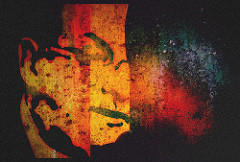 While accepting a Chicago Tribune 2015 Literary Award last week, Salman Rushdie robustly rejected the wave of “safe space” censorship that is currently breaking upon college campuses:
While accepting a Chicago Tribune 2015 Literary Award last week, Salman Rushdie robustly rejected the wave of “safe space” censorship that is currently breaking upon college campuses:
The university is the place where young people should be challenged every day, where everything they know should be put into question, so that they can think and learn and grow up. And the idea that they should be protected from ideas that they might not like is the opposite of what a university should be. It’s ideas that should be protected, the discussion of ideas that should be given a safe place. The university should be a safe space for the life of the mind. That’s what it’s for.
Given his life story, this is unsurprising. In the Autumn of 1989, six months or so after Khomeini had pronounced his infamous fatwa, Rushdie was invited by the Institute of Contemporary Arts in London to deliver the 1990 Herbert Read Memorial Lecture. Writing in Joseph Anton. A Memoir (Jonathan Cape, Random House, London, 2012) p210, Rushdie said
He knew at once that he wanted to write about iconoclasm, to say that in an open society no ideas or beliefs could be ring-fenced or given immunity from challenges of all sorts, philosophical, satirical, profound, superficial, gleeful, irreverent or smart. All liberty required was that the space for discourse itself be protected. Liberty lay in the argument itself, not in the resolution of the argument, in the ability to quarrel, even with the most cherished beliefs of others; a free society was not placid but turbulent. The bazaar of conflicting views was the place where freedom rang.
The lecture was published as Is Nothing Sacred? (Granta, London, 1990), as a companion piece to In Good Faith (Granta, London, 1990), and both are republished in Imaginary Homelands. Essays and Criticism 1981-1991 (Granta, London, 1992) [pp415 and 393 respectively].
Moreover, he accords to others the same liberties he exercises himself. On 22 July 1990, the British Board of Film Classification refused a certificate to International Gorillay (imdb | wikipedia | nyt) a Pakistani movie in which a debauched and villainous Rushdie is eventually struck down by thunderbolts from three Korans. As he wrote in Joseph Anton (p256):
This placed the real Rushdie in something of a quandary. He was fighting a battle for free speech and yet he was being defended, in this case, by an act of censorship. On the other hand the film was a nasty piece of work. In the end he wrote a letter to the BBFC, formally giving up his right of legal recourse, assuring the board that he would pursue neither the filmmaker nor the board itself in the courts, and that he did not wish to be accorded ‘the dubious protection of censorship’. The film should be shown so that it could be seen for the ‘distorted, incompetent piece of trash that it is’. On 17 August as a direct result of his intervention, the board unanimously voted to license the film; whereupon, in spite of all the producer’s efforts to promote it, it immediately sank without a trace, because it was a rotten film, and no matter what its intended audience may have thought about ‘Rushdie’ or even Rushdie, they were too wise to throw their money away on tickets for a dreadful film.
It was, for him, an object-lesson in the importance of the ‘better out than in’ free speech argument – that it was better to allow even the most reprehensible speech than to sweep it under the carpet, better to publicly contest and perhaps deride what was loathsome than to give it the glamour of taboo, and that, for the most part, people could be trusted to tell the good from the bad. If International Gorillay had been banned, it would have become the hottest of hot videos and in the parlours of Bradford and Whitechapel young Muslim men would have gathered behind closed curtains to rejoice in the frying of the apostate. Out in the open, subjected to the judgment of the market, it shrivelled like a vampire in sunlight, and was gone.
One Reply to “The university should be a safe space for the life of the mind – says Salman Rushdie”